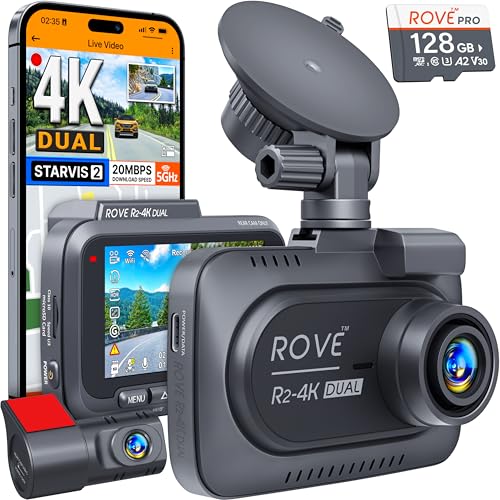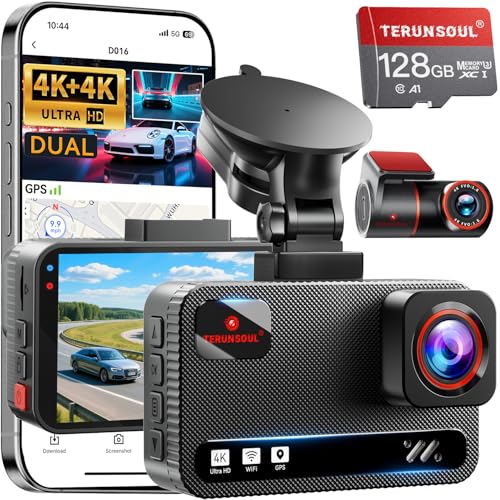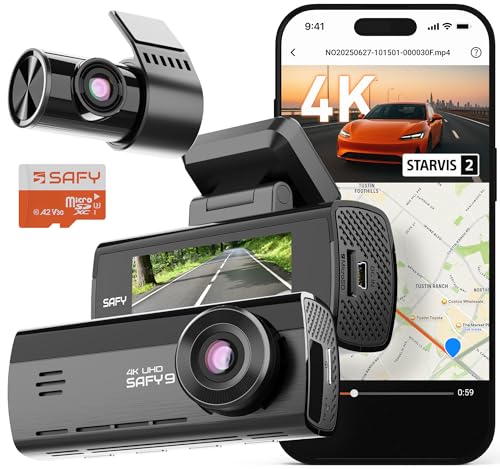It feels like just yesterday I was grappling with the uncertainty of being on the road without a digital eyewitness. The thought of an unexpected incident – a minor fender-bender, erratic driver behavior, or even a parking lot mishap – leaving me without proof was a constant low-level anxiety. That kind of problem absolutely needed solving; without clear video evidence, dealing with insurance claims or disputed incidents could become a convoluted and stressful nightmare.
Before diving into a specific model, it’s crucial to understand why someone might need a vehicle recording system, often called a dash cam. These devices serve as silent witnesses to everything that happens while you’re driving or parked. They are invaluable for documenting accidents, capturing instances of reckless driving, protecting against insurance fraud, and even recording memorable road trips. Anyone who drives regularly, especially in congested areas or for extended periods, is a prime candidate for a dash cam. Rideshare drivers, parents of new drivers, or anyone who wants added security and peace of mind on the road will find this category of product particularly beneficial. However, if you rarely drive or primarily use your vehicle on private property where such incidents are unlikely, a dash cam might be overkill. For those users, perhaps a simple security camera on their property would be more appropriate. When considering a dash cam, think about the coverage you need (front, rear, interior), video resolution, recording features (loop recording, G-sensor), parking mode capabilities, and connectivity options.
- ▶HD 3-Channel WiFi Dash Cam: The J10 dash cam monitors your car’s front and rear, and inside in 4K/2.5K+1080P+1080P resolution, providing all-around surveillance and ensuring high-definition...
- ▶Switchable 4K+1080P Dual Dash Cam Mode: If you don't want to use interior recording or only need to record the front and interior, you can disconnect the rear camera. In both scenarios, the front...
- ▶Built-in 5G WiFi and APP Control: The dash cam features built-in WiFi for easy connectivity, allowing for immediate use once connected. It supports APP both Android and iOS devices. Through the...
Introducing the Tuisau J10 Triple Dash Camera
Enter the Tuisau J10 dash cam, a comprehensive surveillance solution designed to capture activity from multiple angles. This specific triple dash camera makes a bold promise: all-around high-definition coverage for enhanced road security and peace of mind. What you get with the purchase is the main dash cam unit (housing the front and interior cameras), a separate rear camera, a car charger (cigarette lighter plug), cables for connection and power, windshield mounts, cable management clips, a user manual, and crucially, an included 64GB MicroSD card to get you started right away. While specific market leaders might focus on single or dual-channel systems with potentially higher individual camera resolutions or more advanced app features, the Tuisau J10 differentiates itself by offering robust three-channel recording (front, inside, and rear) straight out of the box at a very competitive price point, making comprehensive coverage accessible.
Here’s a quick look at the pros and cons based on my time using it:
Pros:
* Simultaneous three-channel recording (front, inside, rear) offers excellent overall coverage.
* Crisp and clear video quality from the front camera, especially in 4K mode.
* Included 64GB MicroSD card is a great value-add.
* Built-in 5GHz WiFi and mobile app allow for easy video management.
* Reliable G-sensor and loop recording functions work as expected.
* Effective night vision capabilities on all three channels.
Cons:
* The rear camera resolution is notably lower than the front, though still functional.
* Achieving true 24-hour parking monitoring requires a separate hardwire kit.
* Initial app preview can sometimes appear glitchy before downloading footage.
* Cable management for three cameras can be time-consuming for a neat install.
- 4K FRONT + 1080P REAR RECORDING – ROVE R2-4K DUAL dash cam offers dual-channel recording capabilities, capturing footage simultaneously from both the front and rear cameras. The front camera records...
- Ultra HD 4K Front + 4K Rear Recording: The Terunsoul dash cam supports dual-channel simultaneous recording, capturing both front and rear footage. Both cameras record in 3840×2160P, ensuring clear...
- Crystal-Clear 4K + 1080P Recording - Capture every detail in ultra-clear 4K UHD front and Full HD 1080P rear recording with STARVIS (IMX415) sensor and HDR for enhanced clarity day or night.
Deep Dive into the Tuisau J10’s Capabilities
Having used the Tuisau J10 dash cam for quite some time now, I can share a more detailed perspective on its key features and how they perform in real-world use.
Triple Channel Recording (Front + Inside + Rear)
This is arguably the headline feature of the Tuisau J10. The ability to record simultaneously from the front (170° wide angle), inside (1080P), and rear (120° wide angle) is a game-changer for complete vehicle surveillance. The front camera captures the road ahead, crucial for recording traffic incidents or capturing scenery. The interior camera is excellent for ride-share drivers wanting a record of passengers, or simply for monitoring activity inside the vehicle. The rear camera provides vital coverage in case of rear-end collisions or parking lot incidents. In my experience, this three-channel setup provides unparalleled peace of mind. Knowing that all angles are covered means significantly fewer blind spots and a more comprehensive record of events should anything happen. The flexibility to detach the rear camera and have the front automatically bump up to 4K resolution is also a thoughtful design choice, catering to different user needs. This versatility adds significant value.
Video Resolution and Clarity
The Tuisau J10 boasts 4K/2.5K+1080P+1080P resolution depending on the mode. When all three cameras are active, the front records at 2.5K, while the interior and rear record at 1080P. If you disconnect the rear camera, the front elevates to 4K. I’ve found the front camera footage to be consistently sharp and detailed, capturing license plates and road signs clearly during the day. The 4K mode, when used, provides even greater clarity. The interior camera’s 1080P resolution is perfectly adequate for capturing activity inside the cabin. The rear camera, while 1080P, isn’t quite as crisp as the front or interior feeds in my opinion. It’s still functional and provides necessary context, but don’t expect the same level of fine detail as the front camera, particularly in challenging lighting. Overall, the video quality is very good for the price point, especially the front camera, providing the necessary clarity for documentation.
Built-in 5GHz WiFi & APP Control
The integrated 5GHz WiFi is a fantastic feature. Pairing the dash cam with the “Viidure” app (available for both Android and iOS) is straightforward. Once connected, managing your footage becomes incredibly convenient. You can preview live feeds, browse recorded videos, download clips directly to your phone, and even manage settings through the app. The speed of the 5GHz connection makes downloading relatively quick compared to older 2.4GHz systems. While the app preview can sometimes stutter or glitch during playback, downloading the actual file to your device resolves this, providing smooth, clear footage with good audio. The ease of accessing and sharing videos via the app is a major plus, simplifying the process of saving important clips or sharing them if needed.
Night Vision Capabilities
Effective night vision is crucial for a dash cam, and the Tuisau J10 performs well in low-light conditions. All three cameras utilize enhanced night vision technology to capture clear and detailed footage even in poorly lit environments. I’ve been impressed with how well it picks up details like license plates from vehicles in front or behind, and activity inside the cabin, even at night. This feature significantly enhances driving safety and the potential for gathering evidence during nighttime incidents, which are often more challenging to document.
G-Sensor and Loop Recording
These are standard but essential features for any modern dash cam. The built-in G-sensor detects sudden impacts or collisions. When triggered, it automatically locks the current video file, preventing it from being overwritten by the loop recording function. This ensures that critical incident footage is safely stored. Loop recording allows the dash cam to continuously record by overwriting the oldest files when the memory card is full. This means you never have to worry about manually clearing the card under normal circumstances. The Tuisau J10 handles both of these functions reliably, providing automated protection for your recordings. You can set the loop recording duration to 1, 2, or 3 minutes based on your preference.
24 Hours Parking Monitoring
The parking monitoring feature adds an extra layer of security when your car is parked. The dash cam detects vibrations or impacts and automatically wakes up to record short clips, documenting any potential hit-and-runs or vandalism while you’re away. It’s important to note, as the product details clarify, that enabling *continuous* 24-hour parking monitoring requires a separate hardwire kit to provide constant power without draining your car’s battery. Without the hardwire kit, the parking mode relies on the camera’s internal battery (if any) or the car’s power staying on, which is typically only for a short period after the ignition is off. So, while the *feature* is present, achieving its full 24-hour capability necessitates an additional purchase and installation step. This is a minor disadvantage but worth being aware of if constant parking surveillance is a primary need.
Included 64GB SD Card
The fact that the Tuisau J10 comes with a 64GB MicroSD card is a significant bonus. Many dash cams require you to purchase the memory card separately, adding to the overall cost. A 64GB card provides a decent amount of storage space for high-resolution three-channel footage before loop recording starts overwriting old files. While you can upgrade to a larger card (up to 256GB is supported) for even more storage, the included card means you can start using the camera right out of the box without any extra trips to the store. This is a great value proposition.
Easy Installation
The dash cam is designed for straightforward installation. The windshield mounts are easy to attach, and the cables are long enough for routing in most standard vehicles. While neatly tucking away the wires for all three cameras requires a bit of patience and effort (depending on your vehicle’s interior trim), the process itself is intuitive. Tuisau also provides tutorial videos and responsive customer support, which is helpful if you encounter any issues during setup.
What Other Drivers Are Saying
Scrolling through feedback from other drivers who have opted for the Tuisau J10 dash cam, the sentiment is largely positive, echoing many of my own findings. Users frequently praise the ease of installation and setup, often completing it in under 15 minutes. Many highlight the excellent value proposition, getting comprehensive three-channel coverage and features like WiFi and night vision at a budget-friendly price. The clarity of the daytime video, especially from the front camera, receives consistent positive remarks. The peace of mind offered by having front, interior, and rear recording, particularly for ride-share drivers or parents with new drivers, is a recurring theme. While some mention the lower resolution of the rear camera compared to the front or the potential hassle of wire management in smaller cars, these seem to be minor points against the overall functionality and value provided by the device.
Final Thoughts and Recommendation
Navigating the roads without a dash cam leaves you vulnerable, potentially complicating things significantly if you’re ever involved in an incident. The Tuisau J10 3 Channel 4K Dash Cam stands out as an excellent solution to this problem. Its comprehensive three-channel recording covers virtually every angle, providing critical evidence. The combination of good video quality, useful features like reliable G-sensor, loop recording, night vision, and convenient APP control via 5GHz WiFi make it a highly functional device. Add to that the value of the included 64GB SD card, and you have a compelling package that offers significant peace of mind for a reasonable investment. If you’re looking for an affordable yet feature-rich dash cam that covers all your bases, the Tuisau J10 is certainly worth considering. To check it out and see current pricing, click here.
Last update on 2025-10-29 / Affiliate links / Images from Amazon Product Advertising API




